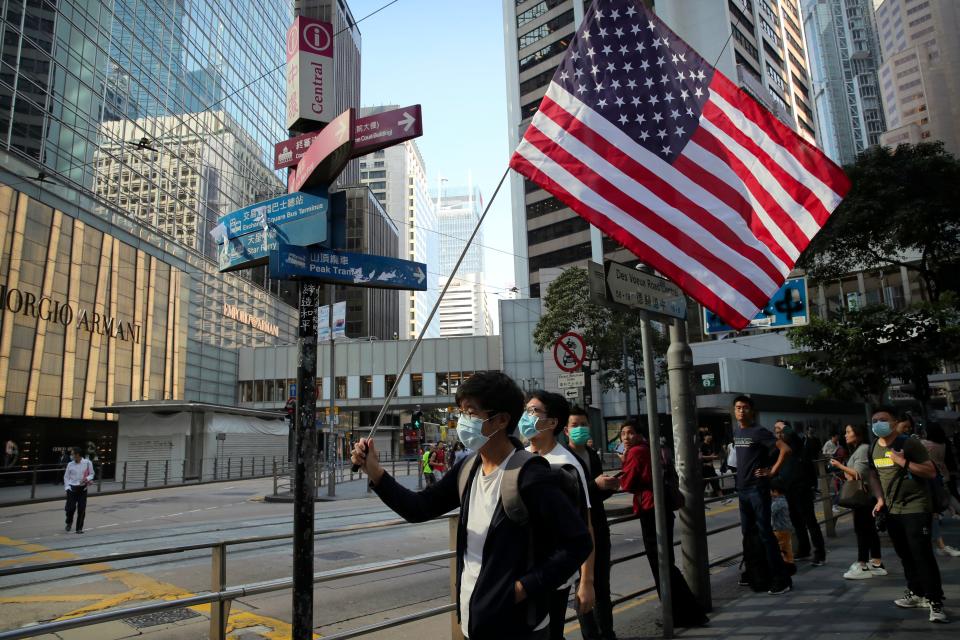With Hong Kong Human Rights and Democracy Act, U.S. Congress stands up to China
Even after being coerced into providing a "betrayal to the motherland" confession, Hong Kong dissident Simon Cheng was told by Chinese authorities he needed to get his mind straight about the evils of liberal democracy. He was handcuffed and shackled to an "X-Cross," forced into a painful squatting position or beaten if he didn't comply — all for hours at a time during a two-week dentention in August.
The former British consulate worker published his account Wednesday on Facebook, a fitting coda to the U.S. Senate's unanimous approval a day earlier of a human rights bill aimed at pressuring China into keeping Hong Kong free.
The city has endured five months of pro-democracy protests that first flooded the streets with millions of people in June and later shut down the airport and subway system. Most recently, violent clashes pitting police with tear gas and live ammunition against demonstrators with petrol bombs and bows and arrows transformed Hong Kong Polytechnic University into a battleground. More than 1,000 protesters were arrested in one day and hospitals filled with hundreds of casualties.
Fatalism grips Hong Kong
At stake are Beijing's tarnished promises in a 1997 treaty allowing, with reacquisition of Hong Kong from Britain, an enclave where free speech, freedom of assembly and an independent judiciary are guaranteed.
The people of Hong Kong have watched these freedoms gradually erode, their peaceful assemblies met with a thuggish state response. Ensuing violence, including regrettable acts by some protesters, has grown increasingly fierce.

CHINA: Stop interfering in Hong Kong affairs. U.S. Senate remains blind to facts.
Beijing threatens even harsher crackdowns, and a strain of fatalism has gripped the city, where parents beg police not to kill their protesting teenagers and someone has scrawled "It's now 1989 4th June" on the windows of an Armani fashion store. The reference is to the heinous Tiananmen Square massacre by Chinese troops of hundreds or thousands of freedom protesters.
Whether the Senate's Hong Kong Human Rights and Democracy Act can temper any of this remains to be seen. (The Senate also passed a second bill that would ban the export of tear gas, pepper spray and other equipment to Hong Kong police.)
The Senate human rights measure still has to be reconciled with a House version, and it's not certain President Donald Trump will sign it. The White House was silent on the bill's passage and the president, preoccupied with talks to end his trade war with China, has offered only mixed and muddled statements about the Hong Kong crisis. Given the overwhelming support in the House and the Senate, Trump risks a humiliating override if he vetoes the legislation out of concern over disrupting relations with Beijing.
Review special trade status
The measure's practical goal is simple: Place at risk Hong Kong's outsize economic benefit to China. The secretary of State would annually review whether Hong Kong retains its promised autonomy. Absent that, the city's special U.S. trade status could be revoked and officials responsible for human rights violations sanctioned.
Because of its freedoms and trade status, Hong Kong has been a stable international financial center and a gateway for global capital flowing into China. The city is exempt from the tariffs Trump has imposed on China. The majority of foreign investment into the country passes through Hong Kong. Any harm to this financing channel risks further destabilizing China's slowing economy.
Protesters have called for the release of arrested demonstrators and an independent inquiry into the conduct of the Hong Kong police. In response, the city's Beijing-backed leadership only appears interested in appeasing President Xi Jinping's demands for a swift restoration of order.
The congressional defenses of democracy provide useful incentives for Chinese authorities to pursue peaceful negotiations to resolve this nightmare, rather than a bloody Tiananmen-like crackdown.
USA TODAY's editorial opinions are decided by its Editorial Board, separate from the news staff. Most editorials are coupled with an opposing view — a unique USA TODAY feature.
To read more editorials, go to the Opinion front page or sign up for the daily Opinion email newsletter. To respond to this editorial, submit a comment to letters@usatoday.com.
If you can't see this reader poll, please refresh your page.
What do you think of our view on Hong Kong?
This article originally appeared on USA TODAY: Will Trump sign Hong Kong Human Rights and Democracy Act against China

